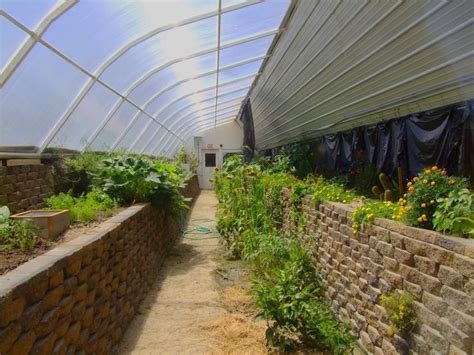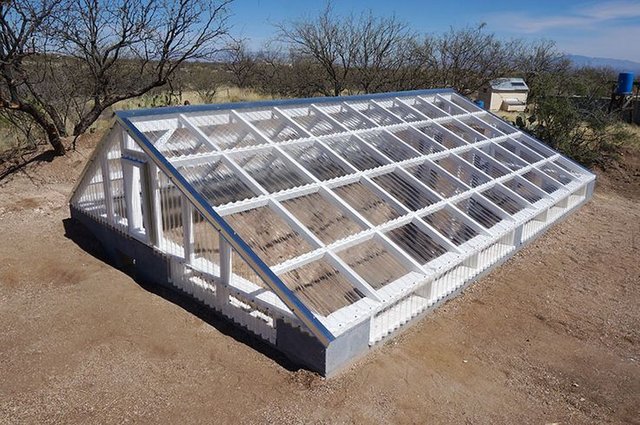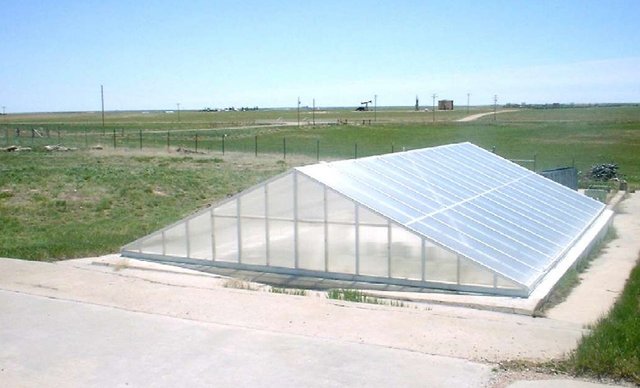
I was recently asked the best question yet.
How are you going to provide all the really good life essentials like coffee, pineapples, oranges, lemons, limes, bananas on a self-sufficient farm community that will be located where it freezes?
It gets pretty cold, even in north Georgia. How will it be possible to exist without some of these essentials without trade and purchase?
After all, when it comes to self-sufficiency, there always seems to be a caveat to the intent of the phrase. "It can rarely be 100%."
My answer? The same way we are going to provide all housing and business structures; underground.
This picture will give you somewhat of an idea of how this works.

And we can even do this as far north as Colorado.
Our Choice
Mother nature maintains a constant source of heat at around 8-10 foot under your feet. A constant 52 degrees Fahrenheit is ready and waiting to utilize. Some existing projects have used air piping, water/glycol piping and others have used tunnels of different sizes. These applications are all partially passive and also partially active.
Full Sail Farm will be utilizing the geothermal heat transfer method using underground polyethylene piping that will be transferring heat via a glycol solution and a high efficiency pump. This solution releases its heat via a fan coil heat exchanger where the air is ducted from the ceiling of the greenhouse, drawn across the heat exchanger coil and then transferred through a supply air duct low to the floor. The ducting also draws from one side and blows from the other allowing a push pull of airflow from left to right of the length, for maximum efficiency.
The problem with blowing air through pipes to extract the heat is that it has a lower efficiency and also the potential for biological growth in the piping. The results are the same as you will witness in the video below.
To get the impact of what the potential is for this, I highly recommend taking a few minutes to watch this YouTube video. This clip is about a guy who retired from the post office 25 years ago and started tinkering with this concept. He is now growing dozens of orange, lime, lemon, fig, and cherry trees in his underground greenhouse on the plains of Nebraska! Here is the video:
img src
Climate Control

Of course there are countless varieties that are better adapted in more challenging environments. It does take trial & error. Each greenhouse will have different climates to fit what is being grown. We just dial in the climate and let natures bounty proceed forth!
Refrigeration
For our cold space storage, Full Sail Farms will utilize 10 foot tall by 16 foot wide tunnels at a depth of around 18 feet, using mother earths natural temperature of around 52 degrees to maintain fruit, potatoes, grains and some vegetables. Directly off of these main food storage tunnels will also be both 40 degree Walk In refrigeration and Walk In freezers. These systems will utilize mechanical refrigeration achieving extremely high efficiency via the geothermal constant temperatures to condense the compressor hot gas and reject the heat.
But wait there’s more!
Now you might be starting to understand how we will be able to provide for our needs of coffee, pineapples, oranges, bananas, limes, lemons and lots of exotic spices such as cardamon and cinnamon.

The farm will utilize lots of different means of energy such as photovoltaics, wind energy, geothermal and some not so natural such as natural gas micro turbines to supplement times of high energy demands. Each of these resources will have either waste heat or excess energy to be able to give toward our more cold sensitive greenhouse environments if needed, and when none is available, we can always resort to the turbines for power! The crops must live!
In certain greenhouse environments, we will utilize aquaponics. This is where we utilize a fish tank, lots of high quality fish, and then filter the nitrogen laden fish waste in the water, via plant watering and thereby provide high nitrogen content fertilizer for the plants, along with lots of minerals. This all gets way cool and involved. The water tanks will also act as a heat sink in the winter. In the summer, the water will also be able to be cooled by the glycol geothermal loop as will the greenhouses in certain conditions. The typical intake and exhaust fan is generally the solution for summer temperature control. We will also be utilizing shade cloth and other shading methods to control excess heat.
Greenhouse Visions
At this point, we are envisioning around (14) 120 foot underground greenhouses. Each will have its own climate control specific for whatever crops we are nurturing. Each will utilize a certain type of passive heat assisted active system to maintain the desired parameters.
We will also be able to start our crops much earlier than any other greenhouse could offer. Early plantings could allow tomato harvests as early as late May and early June and throught the summer and fall. Many crops will be planted in a staggered time line on a rolling basis to keep fresh product ripening up until the last of November. We will also be utilizing soil heating using active solar heat transfer to keep certain crops root systems warm. This helps extend the growing season even longer.
Imagine a consistent supply of every food you need, every spice, herb and more. Be it from cold storage or fresh off the vine. This is how it shall be done.
I can’t wait to pick my morning bananas and peel back a fresh mandarin orange for desert!
Starting to get the Full Sail experience?